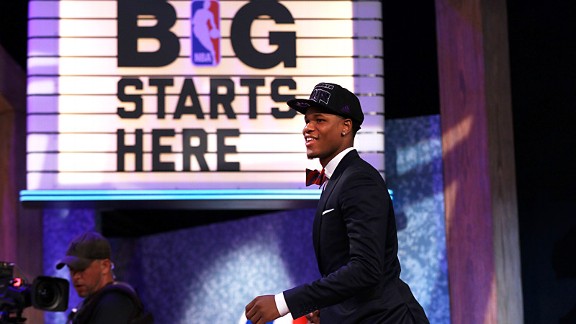 Mike Stobe/NBAE/Getty Images
Mike Stobe/NBAE/Getty ImagesWhat if Ben McLemore and other top picks entered the NBA through free agency instead of the draft?
A number of an economists have addressed the issue of tanking and found that the phenomenon comes and goes, depending on the details of the draft lottery format. A study I co-authored with Brian Soebbing and David Berri -- both of whom have weighed in here on tanking at TrueHoop -- suggests that NBA teams did not tank during the period when the NBA draft lottery format was weighted equally among non-playoff teams in the late 1980s.
Under this format every team that finished out of the playoffs had the same chance of getting the first pick in the next draft. But that format was scrapped because of concerns about competitive balance after several teams that barely missed the playoffs were awarded the first pick. Going back to the equal weight draft lottery would eliminate some of the incentives to tank, but this may have unintended consequences for competitive balance.
But if I was czar of the NBA, my solution would be more radical, and would take care of another problem generated by the NBA entry draft with a single stroke. I would eliminate the draft entirely. All tanking incentives in the NBA originate with the draft, so eliminating the draft eliminates incentives to tank. The alternative is that all incoming players are free agents and can be signed by any team, forcing teams to compete for all incoming talent.
Critics would howl that this policy would wreck competitive balance. The large-market teams would buy up all the good players, leading to a lopsided league of haves and have-nots!
My response to this criticism is: This would be unlikely to happen with the current NBA roster limits and salary cap. Incoming players would be subject to the cap, and rosters spots on NBA teams are limited, so large-market teams could not stockpile all the incoming talent.
The entry draft also gives teams market power (monoposony power, in the jargon of economics) because of rookie-scale contracts, which reduce the earnings of players in the first two or three years of their careers. Free agency would benefit these players, in that some of them would clearly earn higher salaries.
Also, a significant body of economic research suggests that entry drafts, salary caps and revenue sharing do not have any appreciable impact on competitive balance. This further strengthens the argument that eliminating the draft would not hurt competitive balance in the NBA.
I also think it's important to think about tanking from the fan's perspective. While seeing your team intentionally lose games at the end of the season might reduce attendance in the short run, getting the first pick in the NBA draft can significantly improve a team in the NBA, and fans might be willing to trade-off short run intentional losses for long-run success generated by the first pick. No research has addressed this issue, or examined how tanking affects attendance or media revenues, but it’s worth thinking about.
Brad Humphreys is a professor in the College of Business and Economics, Department of Economics at West Virginia University. His research focuses on the economics of sports and gambling.
